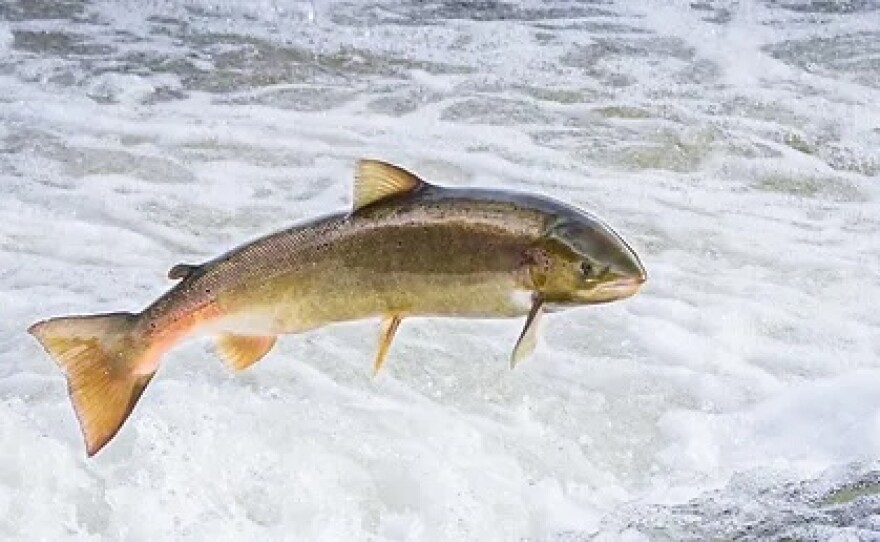Maine has a fascinating and complex relationship with salmon. At first glance, it may seem simple – yes, there is salmon in Maine. But a closer look reveals a nuanced picture involving multiple salmon species, populations, and regulations. In this article, we’ll explore the types of salmon found in Maine, their status, where to catch them legally and ethically, and how to ensure their future.
Three Key Salmon Species in Maine
There are three main salmon species present in Maine waters:
-
Atlantic Salmon – The wild, sea-run form native to Maine rivers and listed as federally endangered. Fishing for them is prohibited. Frequency: 7
-
Landlocked Salmon – A freshwater-only form of Atlantic salmon introduced to lakes and ponds They support a popular sport fishery across the state. Frequency 12
-
Farmed Atlantic Salmon – Raised in commercial ocean net pens along the coast, Harvest regulations apply Frequency 5
The Plight of Wild Atlantic Salmon
Historically, Maine rivers teemed with wild Atlantic salmon, with annual runs up to 100,000 fish. Dams, overfishing and habitat loss caused severe declines. Now only about 2,000 wild salmon return to Maine rivers yearly.
In 2000 all wild Atlantic salmon in Maine received Endangered Species Act protection. Recreational fishing closed statewide. Restoring persistent runs remains elusive despite intensive conservation efforts.
Though rare, some wild Atlantic salmon still brave Maine’s rivers. Ethical anglers carefully follow regulations to avoid disturbing these iconic fish on their strenuous spawning journeys upstream.
Where to Catch Salmon Legally in Maine
-
Landlocked Salmon – Found in over 300 lakes statewide thanks to stocking efforts. Provide popular fisheries across Western and Northern Maine.
-
Farmed Atlantic Salmon – Commercially harvested in coastal net pens by aquaculture companies. No public access.
-
Wild Atlantic Salmon – Cannot be legally targeted or kept anywhere in Maine. Their endangered status means avoiding accidental catches.
Ethical anglers understand which salmon are open to harvest, carefully release any incidental wild fish, and avoid closed spawning river pools during migration periods.
Threats Facing Maine’s Salmon
Wild Atlantic salmon’s endangered situation highlights the many threats they face:
-
Dams blocking migratory routes and altering habitat
-
Climate change impacting water temperatures and ecology
-
Pollution from agricultural, industrial, mining and urban sources
-
Competition and predation from non-native species
-
Commercial aquaculture concerns like fish escapes
Holistic habitat and fisheries management reforms are essential to safeguard all Maine salmon species from mounting pressures.
The Outlook for the Future
The future of salmon in Maine remains uncertain. Wild Atlantic salmon cling to fragile survival despite dedicated recovery efforts. Landlocked populations rely heavily on hatchery stocking vulnerable to funding cuts. Yet hope persists.
With ethical stewardship, scientific guidance and public support, salmon’s majestic presence in Maine waters can endure. Perhaps future generations will again witness robust wild Atlantic salmon runs surging inland, continuing an ancient rite. For now, these amazing fish compel us to strive to balance human demands with ecological needs – their survival is tied to the health of our shared waters.
FAQs About Salmon in Maine
Here are brief answers to some frequently asked questions:
What salmon species occur in Maine?
Atlantic salmon (endangered wild runs and farmed), landlocked salmon (stocked), minor char/trout (salmonids).
Can you fish for wild Atlantic salmon in Maine?
No, it is prohibited due to their endangered status. Strict regulations protect them.
Where are landlocked salmon found in Maine?
Stocked in over 300 lakes and around 320 miles of rivers/streams statewide.
How are landlocked salmon stocked?
Raised in state hatcheries from native broodstock, then stocked as fry or fingerlings.
Where are Atlantic salmon farmed in Maine?
In ocean net pens in coastal bays, primarily Downeast Maine. No public access.
How can anglers help conserve salmon?
Follow regulations, carefully release wild fish, support habitat efforts, practice ethical catch-and-release.
Conclusion
Maine’s complex relationship with salmon highlights the need to balance resource use with conservation. Wild Atlantic salmon’s struggles showcase the importance of habitat protections and ecosystem-based fisheries management. Ethics also matter, as individuals can minimize harm through responsible choices. With care and wisdom, Maine’s diverse salmon can provide beauty and enjoyment for generations to come – icons of what we must strive to protect.

